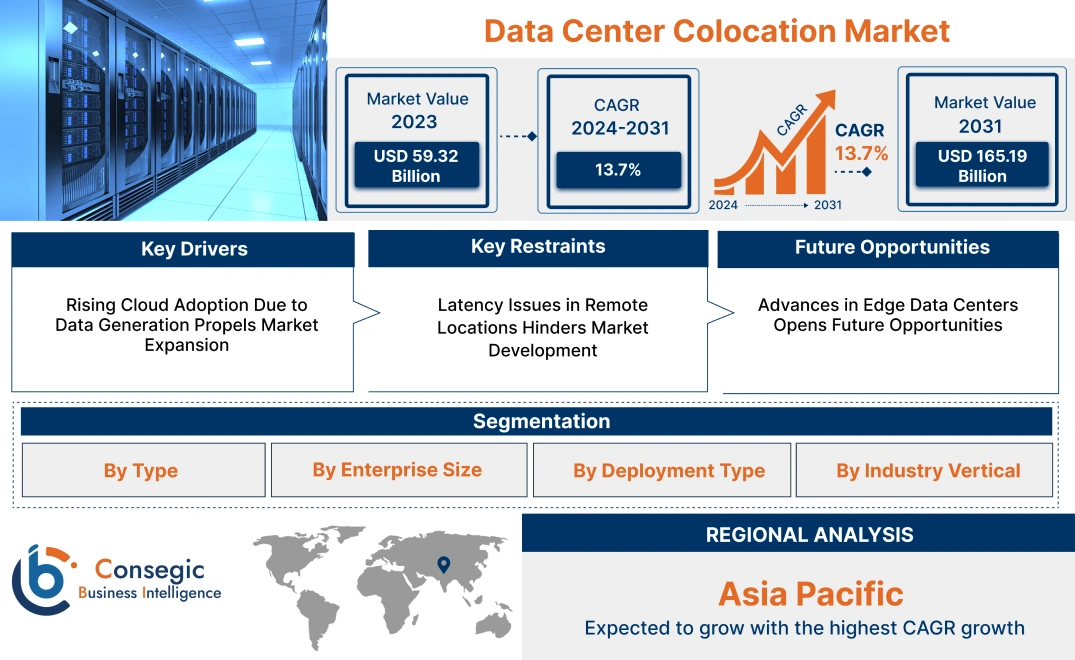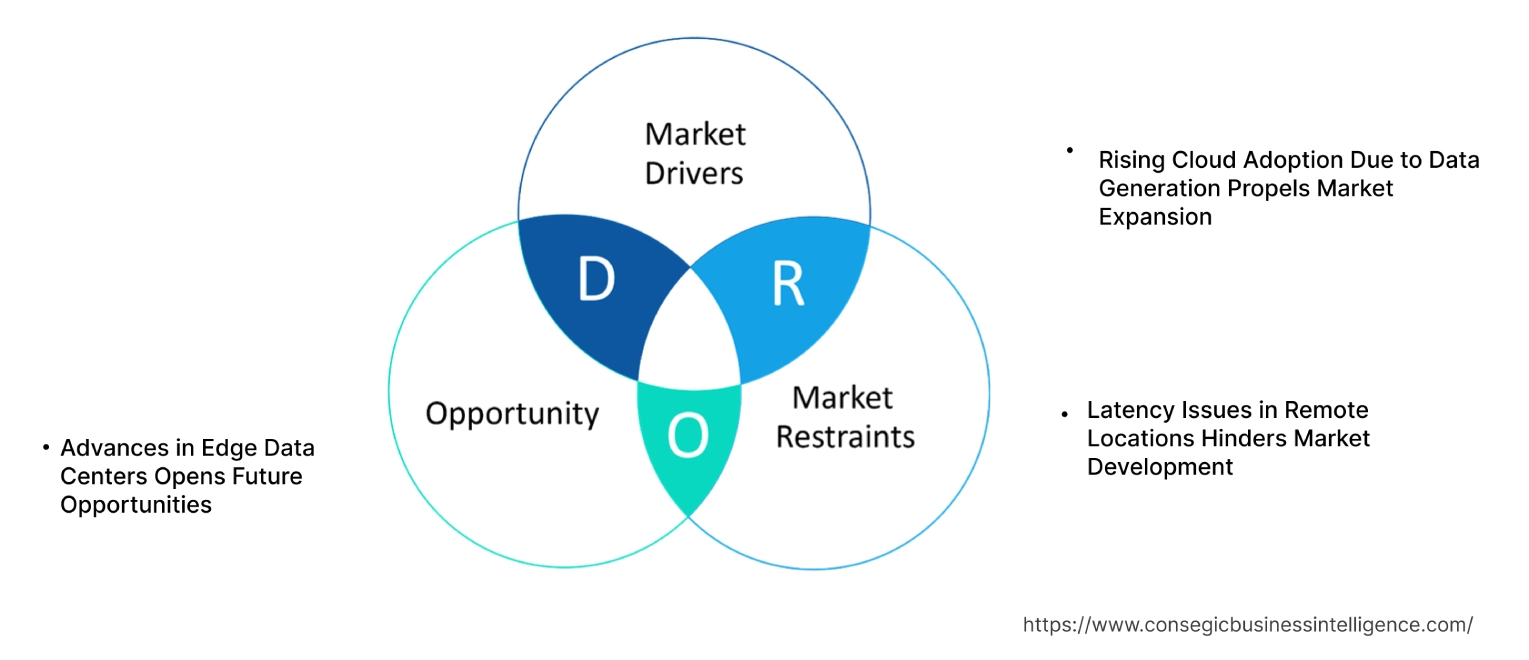- Summary
- Table Of Content
- Methodology
Data Center Colocation Market Size:
Data Center Colocation Market size is estimated to reach over USD 165.19 Billion by 2031 from a value of USD 59.32 Billion in 2023 and is projected to grow by USD 66.36 Billion in 2024, growing at a CAGR of 13.7% from 2024 to 2031.
Data Center Colocation Market Scope & Overview:
Data center colocation is described as the practice of renting out space in a third-party data center for the purpose of hosting an external organization's servers and other computing hardware. This enables companies to outsource their critical infrastructure, data management, and maintenance, which in return benefits them with enhanced security, connectivity, and scalability. It enables organizations to have access to high-end facilities provided by advanced data centers without the cost of building or purchasing their own infrastructure. Major use cases include cloud computing, disaster recovery, and network optimization. Major consumers of data center colocation include IT and telecom, banking, financial services & insurance (BFSI), healthcare, and government institutions.
Data Center Colocation Market Insights:
Key Drivers:
Rising Cloud Adoption Due to Data Generation Propels Market Expansion
Cloud services are becoming more and more popular as a result of the use of a cloud medium, which results in huge amounts of data stored in centers not being held back by any location constraint. Due to the digital shift, companies have thus been forced to gather, store, and analyze data using these tools from sources such as IoT devices, social media, and other sources. Hyper is the race for much better infrastructure.
Colocation services furnished to them serve as the right spots for their computers thereby making it easy to relate to the cloud and for the purpose of ensuring that there is high-speed connectivity, redundancy, and security. This way companies are encouraged both to cut costs on the cloud tool availability and to better employ these resources to improve other processes. There are more so, production lines and other assemblies air to give rise to more sustainable development and efficient resource allocation. The increased amount of data through cloud computing due to data generation is the underlying cause of the data center colocation market growth.
Key Restraints :
Latency Issues in Remote Locations Hinders Market Development
Latency problems in remote places are holding back the increase in the data center colocation market demand. More and more firms are moving to real-time data processing and cloud-based applications; high latency could cause slow performance, bad user experience, and inefficiency in organizations. In some areas, with poor connectivity or that are far from the colocation facilities, companies might have trouble being able to get data with no time gap resulting in delays in decision-making and service delivery.
As a result, this drawback repels potential customers from seeking colocation jobs because the possibilities of scaling up and the freedom needed are destroyed by the slow times of the system. Thus, tackling latency problems is the main thing for colocation vendors who want to stand out in the market and meet the requirements for secure and reliable data solutions in the face of rapid technological changes.
Future Opportunities :
Advances in Edge Data Centers Opens Future Opportunities
Organizations, as they try to serve the real-time demand and low-latency requirements of IoT, autonomous vehicles, and smart cities amongst others, can simply make local smart data transmission near the sensor a possibility. The emergence of such an infrastructure change clearly brings the capability to produce real-time data and improves the performance of DSC1 like no one else produces the same product. This helps them reduce costs, improve their services, and save time since they are not sending. IoT, AV, and smart cities are some of the devices and services that regularly create data so that they can be used, and they always have to be processed quickly.
Moreover, it is more effective as a solution, as it offers better heat dissipation, energy efficiency, and lower operating costs.
- In April 2023, the Edge data center offering was launched by Rai Way, ensuring the usage of 100% renewable energy and minimizing energy consumption. The data centers will be interconnected with the help of the Rai Way fiber optic backbone.
Thus, as per the market trends analysis, the improvements in edge computing are going to be the future of data center colocation providers, giving them the chance to expand their operations.
Data Center Colocation Market Segmental Analysis :
By Type:
Based on type, the market is segmented into retail colocation and wholesale colocation.
Trends in the Type:
- The micro data centers provided by retail colocation provide greater scalability and flexibility to the organizations requiring localized data processing.
- The energy efficiency and efficiency of large-scale operations are achieved with innovations in liquid cooling technologies.
Retail Colocation accounted for the largest revenue share of the total data center colocation market share in 2023.
- Retail Colocation is a service, where businesses can lease small spaces measures in racks or cabinets, in order to store their servers, equipment, and computing hardware.
- Without any significant capital investments businesses can get immediate access to colocation services using this facility.
- It is useful for small and medium enterprises, ensuring flexibility and scalability of operations according to data size.
- Therefore, the analysis shows that the flexibility, scalability, and reduction in cost significantly drive the segment in the market.
Wholesale Colocation is anticipated to register the fastest CAGR during the forecast period.
- Wholesale Colocation is a service, where businesses can lease large spaces, measured in floor space or rooms. Here a single customer can own the rent the entire space without sharing it with anyone.
- The large organizations with massive data loads, such as cloud service providers, and content delivery networks utilize the model for IT infrastructure.
- They optimize the data management costs for organizations, by reducing the per-unit costs for large-scale operations.
- Therefore, the cost-effectiveness and the efficiency in managing data loads for large-scale organizations, place the sector as the fastest growing in the market.
By Enterprise Size:
Based on enterprise size, the market is segmented into small and medium-sized enterprises (SMEs) and large enterprises.
Trends in the Enterprise Size:
- In order to improve operational efficiency by enhancing power and cooling, AI-based colocation services are continuously being adopted by large enterprises.
- Edge colocation enables reduced latency and improved performance for cloud-based services, utilizing localized data centers by businesses.
Large Enterprises accounted for the largest revenue of the overall data center colocation market share in 2023.
- Large organizations across various regions require multiple colocation services including storage, management, and processing of data.
- The requirement to ensure security, uptime, and efficiency of large-scale operations across the enterprises, accelerates the requirement for these services.
- Additionally, the rapid adoption of advanced technologies like cloud solutions, artificial intelligence, and machine learning, contributes to the shift towards colocation services.
- In December 2023, a joint generative AI Center of Excellence was launched by Accenture and Google Cloud in order to help businesses utilize AI for new business opportunities. They will provide the enterprises with tools to scale AI solutions which includes Google's Gemini model.
- Therefore, segmental trends analysis shows that efficiency, security, and advancement in technology drive the market.
SMEs are anticipated to register the fastest CAGR during the forecast period.
- To manage the growing amount of data, while ensuring reduced overall cost and enhanced security, SMEs are increasingly moving towards colocation services.
- The retail colocation allows SMEs to adapt to the growing data needs without imposing any hefty capital expenditure.
- Sectors like e-commerce and fintech are increasingly adopting these services with the rapid digitalization and adoption of cloud-based solutions, as data management is of the utmost significance for them.
- Therefore, the move towards digital transformation and the scalability provided to SMEs, drives the data center colocation market trends.
By Deployment Type:
Based on deployment type, the market is segmented into cloud and on-premises.
Trends in the Deployment Type:
- On-premises data centers are seeing innovations in green data centers, which include enterprises adopting renewable energy solutions and energy-efficient technology to reduce operational costs and carbon effects.
- The combined use of edge computing along with on-premises colocation enables businesses to process data closer to the data source, which benefits them with real-time data analysis and reduced latency.
The cloud sector accounted for the largest revenue share in 2023 and is anticipated to register the fastest CAGR during the forecast period.
- In order to achieve improved scalability, flexibility, and reduced overall cost, especially on physical infrastructure, cloud deployment is used to host the organization's data off-premises.
- The surge in cloud colocation services is due to the growing need for SaaS, PaaS, and IaaS models, in order to handle the growing data needs.
- Cloud colocation also enables advanced features like enhanced disaster recovery and business continuity features that ensure data security and accessibility in case of system failure.
- In June 2021, a cloud data center was launched by Acronis in India. It provides protection against cyber-attacks and ensures data compliance, along with faster access, data availability, and data sovereignty.
- The increasing shift from commercial data storage to hybrid cloud, in which businesses combine public and private cloud infrastructures, is in turn favoring cloud colocation services.
- The conclusion is that features like flexibility, scalability, and cost-effectiveness of cloud-based solutions are the driving factors for the data center colocation market demand.
By Industry Vertical:
The market is segmented into BFSI, IT & telecom, healthcare, government and defense, energy, retail, manufacturing, media and entertainment, and others.
Trends in the Industry Vertical:
- The BFSI sector is competing colocation against fintech innovations, which provide the required infrastructure for real-time transaction processing, blockchain, and AI-powered financial services.
- The government and defense sectors are moving towards implementing colocation services for secure and resilient data infrastructure, which is vital for managing confidential data and, at the same time, ensuring operational consistency in critical situations.
IT & Telecom accounted for the largest revenue share of 28.09% in 2023
- The IT & telecom sector is heavily dependent on data centers for managing huge amounts of data generated by services like network services, cloud computing, and telecommunication operations.
- The global rollout of 5G technology is helping the demand for colocation services within the telecom sector to rise at an exponential rate because of high-speed data transmission and low latency requirements.
- Data center colocation helps the IT & telecom sector with scalable infrastructure solutions, which are required for the management of its increasing need for data processing and storage.
- In April 2022, Compass Quantum was launched by Compass Datacenters a colocation giant, which offers a White Space-as-a-Service model. This ensures the deployment of 100kW modular data centers by the customers.
- In conclusion, the expanding telecom networks and demand for advanced IT infrastructure are the driving factors for the IT & telecom sector's dominance in the data center colocation market growth.
The Healthcare sector is anticipated to register the fastest CAGR during the forecast period.
- The healthcare sector is already adopting new digital health technologies such as telemedicine, electronic health records, and diagnostics driven by AI tools, which require secure and scalable colocation services.
- Data center colocation helps healthcare organizations with the necessary infrastructure for the storage and processing of large data volumes, which include sensitive patient data, along with ensuring regulatory compliance such as HIPAA.
- The shift inclined towards personalized medicine and increased adoption of AI in healthcare is further driving the need for colocation services because these services generate huge amounts of data that require secure and fast storage along with processing.
- The growth of healthcare cloud services, which consist of telehealth and medical imaging, is determining the need for reliable colocation services, which should ensure data accessibility and security.
- The conclusion is that rapid implementation of digital health solutions, along with the growing importance of data security and compliance, are the key drivers for the healthcare sector in the data center colocation market trends.
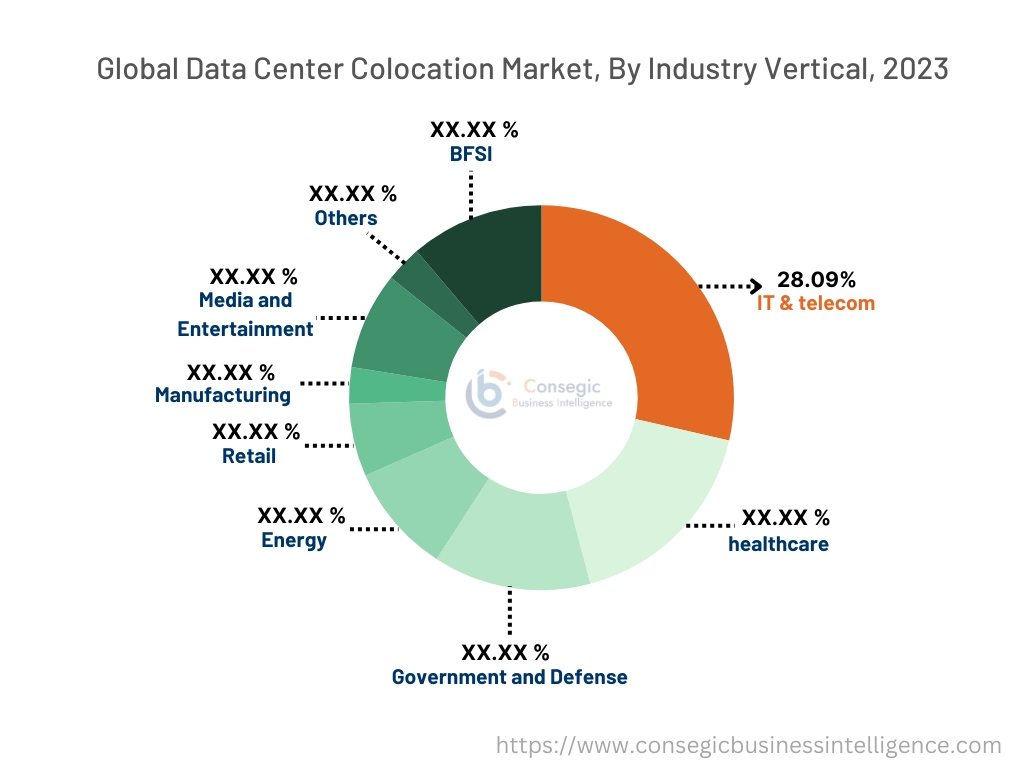
Regional Analysis:
The regions covered are North America, Europe, Asia Pacific, the Middle East and Africa, and Latin America.
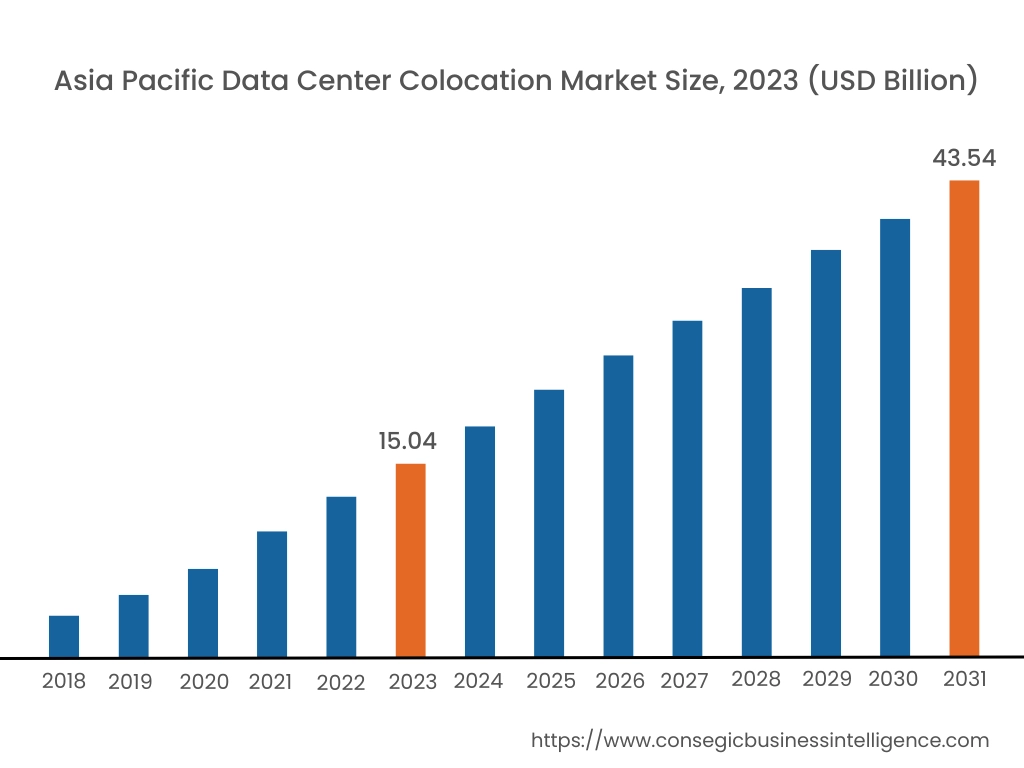
Asia Pacific region was valued at USD 15.04 Billion in 2023. Moreover, it is projected to grow by USD 16.89 Billion in 2024 and reach over USD 43.54 Billion by 2031. Out of this, China accounted for the maximum revenue share of 30.6%. As the data center colocation market analysis, the key driver of this growth is rapid digital transformation in the region, particularly in emerging economies like China and India, where the adoption of e-commerce, fintech, and cloud services is growing. Meanwhile, this region is heavily investing in 5G technology and AI, which is also boosting the need for data centers to support high-speed internet and smart applications.
- In July 2023, the Osaka-based data center, KIX13, became NVIDIA DGX H100-certified according to the announcement made by Digital Realty making it a part of the NVIDIA DGX-Ready Data Center program. This enables the utilization of AI workload deployments on NVIDIA's latest AI infrastructure, DGX H100 for KIX13.
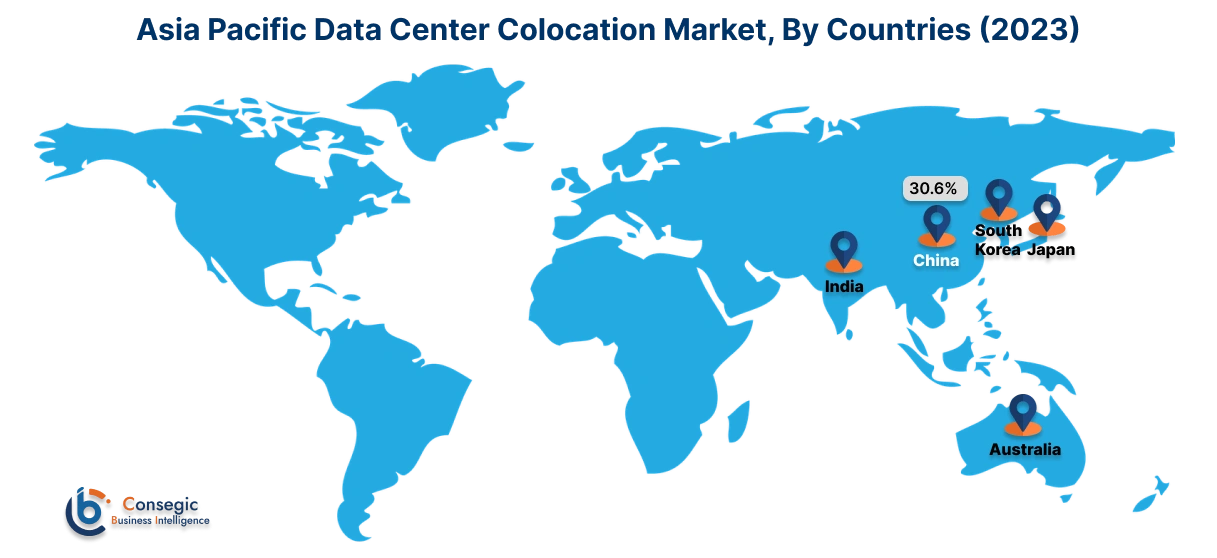
North America is estimated to reach over USD 55.77 Billion by 2031 from a value of USD 19.86 Billion in 2023 and is projected to grow by USD 22.24 Billion in 2024. The major factor for this growth in the market is the increasing need for cloud computing and hyperscale data centers. Organizations accounting for various industries are now more and more dependent on cloud solutions, which is causing higher usage for data center space. Major cloud providers like Amazon Web Services (AWS), Google Cloud, and Microsoft Azure are expanding their footprint in the region, resulting in significant investments in colocation facilities to support their massive data needs.
- In November 2023, a modular data center solution called TimberMod was launched by Vertiv, made from timber that was sustainably harvested. This ensures the reduction of carbon footprint in data centers and meets the sustainability demands.
Europe's market is focused on strict data sovereignty laws and the increasing need for GDPR-compliant data storage. As businesses across the region follow the regulatory requirement, it increases the need for local data centers to maintain the data inside EU borders. This regulatory push is fuelling growth in colocation services, particularly in countries like Germany, France, and the Netherlands, where multiple large-scale data centers are set up to meet the increased demands.
The data center colocation market analysis in the Middle East and Africa shows that the driving factor is the growing utilization of digital services and smart city initiatives, especially in the countries of the UAE and Saudi Arabia. These countries are spending huge amounts of money on digital infrastructure, which is boosting the data center colocation market expansion.
In Latin America, the market is rising because of more and more use of cloud computing and enterprise data storage solutions, particularly in Brazil and Mexico. The region is driving the market because of the evolving start-up ecosystem and the digital transformation of various industries.
Top Key Players & Market Share Insights:
The Data Center Colocation market is highly competitive with major players providing services to the national and international markets. Key players are adopting several strategies in research and development (R&D), product innovation, and end-user launches to hold a strong position in the global data center colocation market. Key players in the data center colocation industry include-
- Equinix, Inc. (USA)
- Digital Realty Trust (USA)
- China Telecom Corporation Limited (China)
- CyrusOne (USA)
- CoreSite (USA)
- NTT Communications Corporation (Japan)
- Global Switch (UK)
- KDDI Corporation (Japan)
- AT&T Intellectual Property (USA)
- Telehouse (Japan)
Recent Industry Developments :
Product Launches:
- In June 2024, a new simplified data center infrastructure, Nexus HyperFabric AI Clusters was launched by Cisco and NVIDIA, especially for generative AI. This ensures the deployment, management, and monitoring of data centers, colocation facilities, and edge sites.
- In June 2024, an emergency backup power colocation data center was secured with mtu Kinetic PowerPacks by Rools-Royce in Colorado. This ensures the immediate response to outages or the power distribution from the grid.
- In March 2024, a new modular data center offering called EcoCore was launched by Nautilus. This product is based on a cooling technology offering, enhancing the prefabrication efficiency and streamlining the construction process.
Mergers & Acquisitions:
- In January 2024, Indosat's entire data center and edge site portfolio was acquired by BDx for $170M. This ensures the enhancement of customer service and expanding their market to Indonesia.
- In November 2023, Brookfield. The agreement will help Cyxtera strengthen its financial health and business position.
Partnerships & Collaborations:
- In January 2024, Reach was expanded to the AI market with the DartPoints and Virtuous AI collaboration. This ensures the accurate delivery of multi-modal models using a carrier-neutral colocation data center.
Data Center Colocation Market Report Insights :
| Report Attributes | Report Details |
| Study Timeline | 2018-2031 |
| Market Size in 2031 | USD 165.19 Billion |
| CAGR (2024-2031) | 13.7% |
| By Type |
|
| By Enterprise Size |
|
| By Deployment Type |
|
| By Industry Vertical |
|
| By Region |
|
| Key Players |
|
| North America | U.S. Canada Mexico |
| Europe | U.K. Germany France Spain Italy Russia Benelux Rest of Europe |
| APAC | China South Korea Japan India Australia ASEAN Rest of Asia-Pacific |
| Middle East and Africa | GCC Turkey South Africa Rest of MEA |
| LATAM | Brazil Argentina Chile Rest of LATAM |
| Report Coverage |
|
Key Questions Answered in the Report
How big is the Data Center Colocation Market? +
Data Center Colocation Market size is estimated to reach over USD 165.19 Billion by 2031 from a value of USD 59.32 Billion in 2023 and is projected to grow by USD 66.36 Billion in 2024, growing at a CAGR of 13.7% from 2024 to 2031.
What specific segmentation details are covered in the Data Center Colocation market report? +
The Data Center Colocation market report includes specific segmentation details for type, deployment type, enterprise size, industry vertical, and region.
Which is the fastest segment anticipated to impact the market growth? +
In the deployment type segment, cloud sector is the fastest-growing segment during the scalability and flexibility of operations and advancements in technology.
Who are the major players in the Data Center Colocation market? +
The key participants in the Data Center Colocation market are Equinix, Inc. (USA), Digital Realty Trust (USA), NTT Communications Corporation (Japan), China Telecom Corporation Limited (China), CyrusOne (USA), CoreSite (USA), Global Switch (UK), KDDI Corporation (Japan), AT&T Intellectual Property (USA), Telehouse (Japan)
